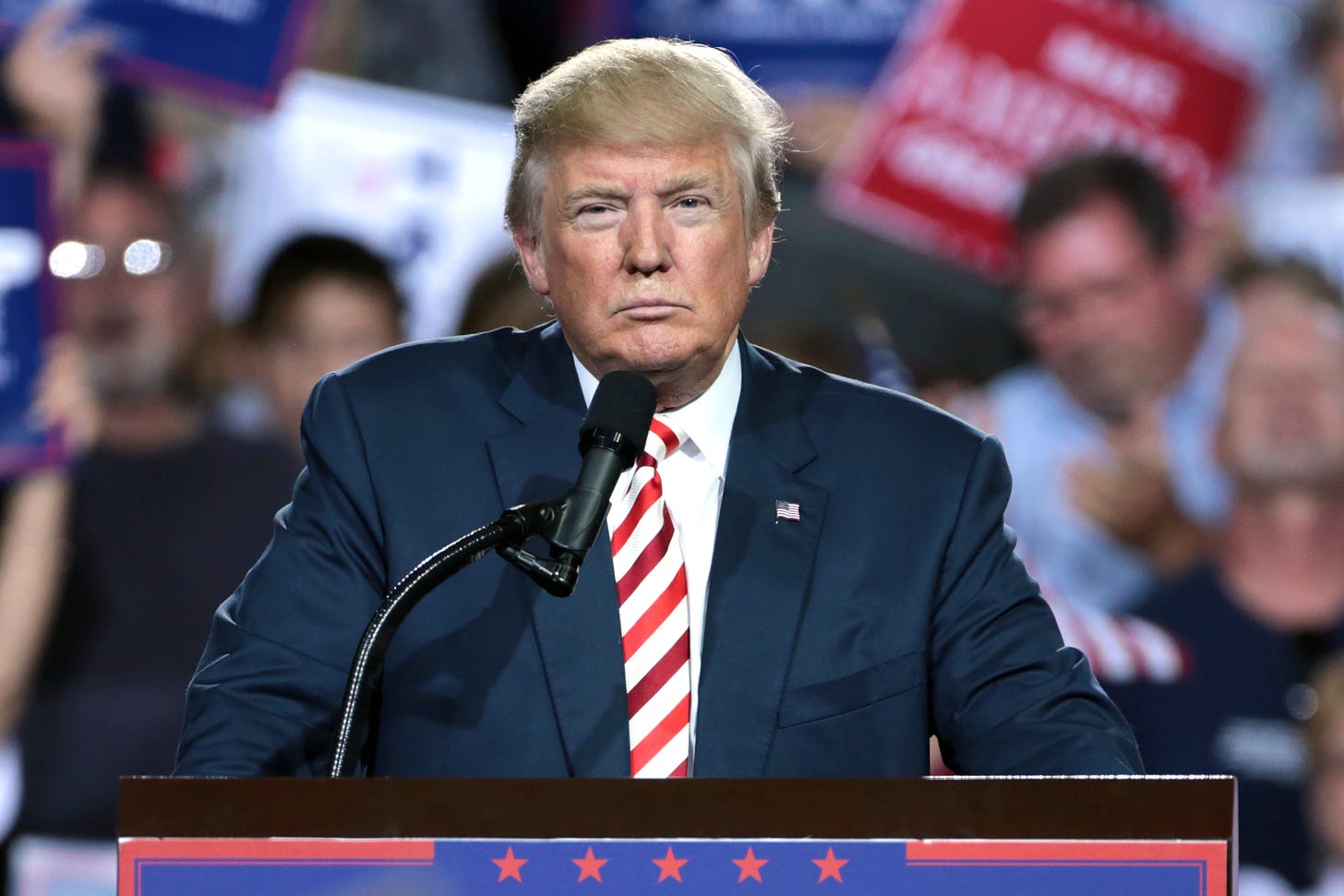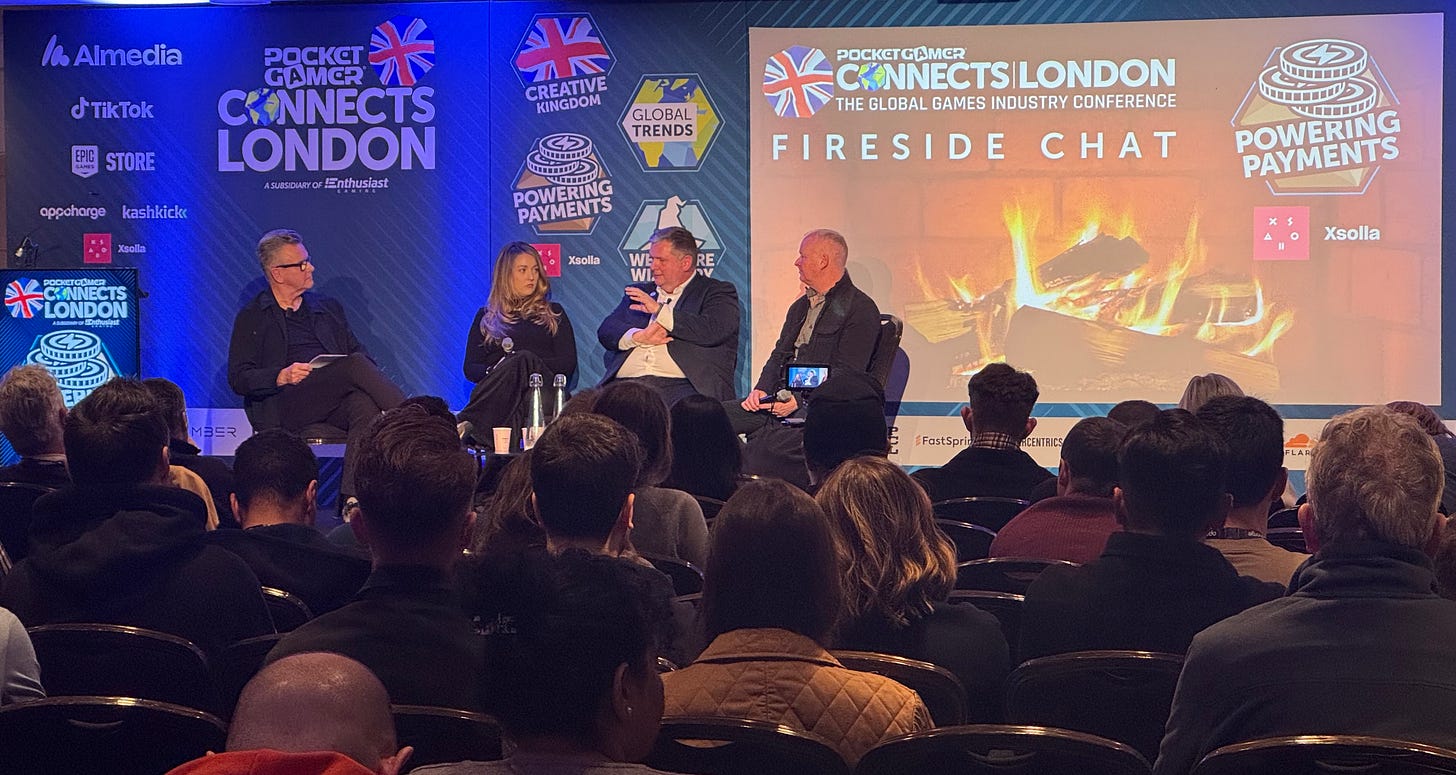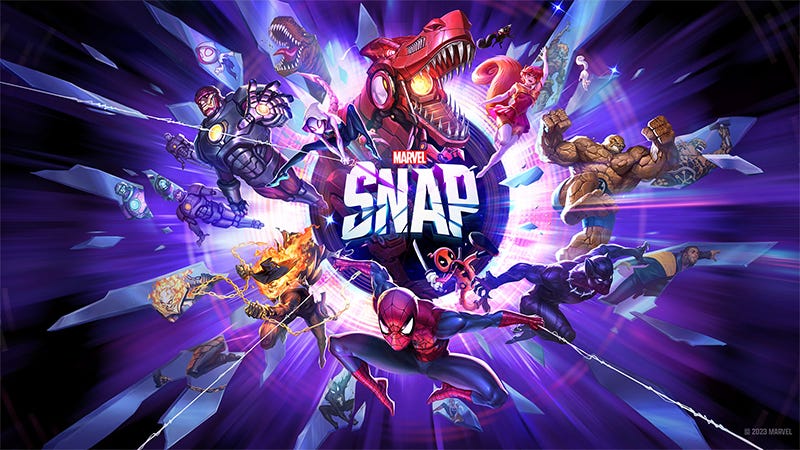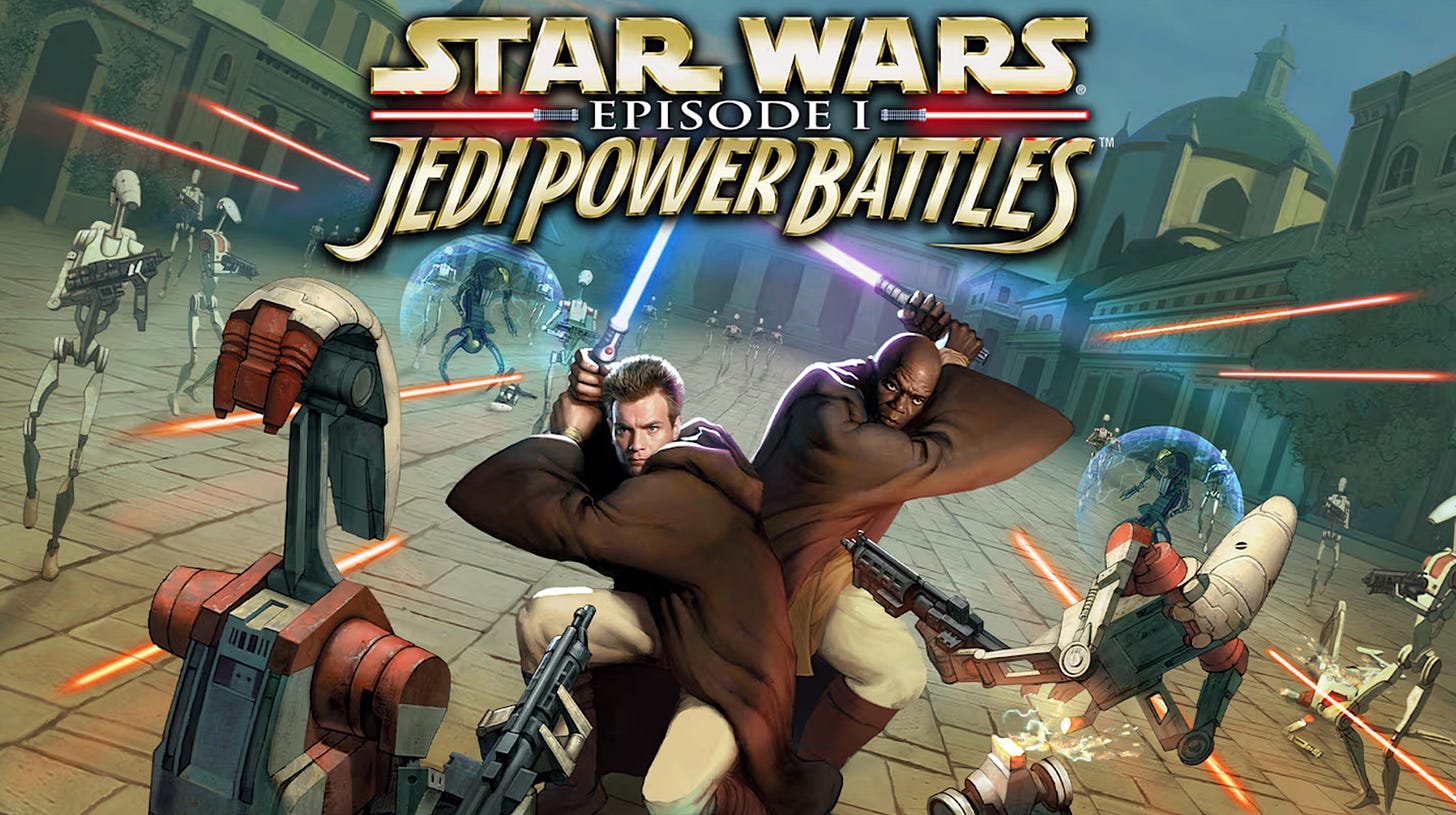Donald Trump’s return as President sets the mood music at Pocket Gamer Connects
Marvel Snap becomes unwitting victim of TikTok takedown
A thin week of video game releases reminds me to keep playing the new Indiana Jones game
| Find me on Linkedin | Follow me on Bluesky | Pre-order my book | Email me |
Hello again,
Welcome back to another edition of VGIM.
I had a great time at Pocket Gamer Connects this week, before having a slightly less great time with our good friends at the National Health Service. Bah.
While I am ok, it has meant that I’ve had a quieter week than usual and don’t have that much to update you on this week.
But if you do want to keep me feeling chipper, consider either grabbing a discounted VGIM Insider membership or securing a sponsorship slot for your business in the newsletter.
It helps VGIM go from strength to strength and gives me a nice little dopamine hit when the confirmation email lands in my inbox. Nice, right?
Anyway, enough of the flogging. Let’s discuss the re-election of a certain President, shall we?
The big read - Trumped up
Donald Trump is back in office. And once again, the world is reshaping ominously around him.
The heavily tanned convicted felon returned to office on Monday 20th January promising to deliver a “golden age” for America in the name of national unity.
He then immediately took a number of actions that contradicted this, including pardoning the majority of the January 6th rioters, withdrawing the United States from the Paris Climate Agreement, dismantling federal standards around diversity and inclusion and declaring a national emergency along America’s southern border. Hmm.
So it wasn’t much of a surprise that at Pocket Gamer Connects London, which started on the same day as Trump’s inauguration, that speakers and attendees were mulling over what it could all mean for the international games business.
And from what I heard, the answer seems like it could be pretty big across a number of key areas.
Make Games Great Again?
Anyone hoping for respite from Trump talk at Pocket Gamer Connects had their dreams dashed within five minutes of the conference starting.
In an effort to deliver some different framing on “2024 was a disaster, let’s cross our fingers for something better in 2025” chit-chat, Chris James, Co-Founder and CEO of Steel Media, kicked off proceedings with a suggestion that the industry needed some MAGA swagger to get its mojo back.
I have to stress here that much of it was done for comic effect, with Chris jokingly donning a “Make Games Great Again” red cap and suggesting that the company was on the cusp of launching new events in Greenland and Panama.
Judging by the audience’s reaction to the material, it isn’t forming the basis of a tight five worth of gracing The Comedy Store later this year.
However, Chris’s talk had a deeper point to it than simply making satirical gags potentially inappropriately early on a Monday morning.
Irrespective of what you think of Trump’s policies, Chris argued that the MAGA movement’s energy, enthusiasm and ambition is in many ways magnetically irresistible - something that has given it more power than it realistically should have.
Therefore, his argument went, the industry should seek to embrace the spirit of that enthusiasm to try to dig itself out of the miserable miasma that has hung over the sector for the best part of 18 months.
To some extent, I can see the point he was trying to make.
Morale in the industry has been fragile, with waves of lay-offs, studio closures and predictions from big-brained analysts such as Matthew Ball suggesting tough times lie ahead.
In this context, there is room for the games industry to try to re-energise itself with big, bold talk. After all, if you can’t generate energy and enthusiasm from within, how can you expect others from the world beyond the industry’s borders to follow suit?
Equally though, I feel uncomfortable looking too closely at MAGA for inspiration for two major reasons.
The first is that the energy emanating from MAGA is inseparable from its populist outlook on the world.
While it often positions itself as a broad tent movement - and has demonstrated that to some extent through victory in the 2016 and 2024 elections - its loudest proponents have promoted policies that are bathed in nativism, conspiracy theories and an often pathological dislike of evidence.
If the games industry wants to replicate its energy, they’ll have to lean even further into it than a number of West Coast tech businesses already are; something that’ll be uncomfortable for most of the games world.
But second, and more importantly, I think the fact that a conversation like this is even opening up a games conference suggests something much more explicit about where we are in the world today.
It isn’t just that Trump has made MAGA mainstream through his most recent victory; it’s that it’s now been turned into the dominant political framework in the West and, by extension, much of the world.
So if the games business is to bounce back, it feels less like it’s about whether it embraces the spirit of a controversial movement and more about how it adapts to a seemingly more substantial shift in the political landscape than Trump’s first term in office.
And as I found out through the rest of the conference, his return is shaping the policy landscape within which we work already.
A message from our sponsor Arbuthnot Latham: We support your video gaming and immersive tech business in the UK with solutions for foreign investments, making the most of income streams, and industry network connections. Explore opportunities and overcome challenges in this thriving sector with our expert guidance.
Not so safe
The first main area where the Trump administration is driving policy change is within the field of online safety.
Over the past half decade, the direction of travel on the topic has leaned much more towards efforts to protect children and vulnerable users over matters such as free speech and privacy.
In places like Australia, the EU and the UK, laws policing user-to-user communication platforms have focused on protecting users from a range of illegal harms - like sexual abuse and access to extremist content - through imposing duties of care on platforms, enforcing transparent reporting of issues and developing processes to tackle such content or risk significant fines.
And while the United States has imposed fewer such burdens on businesses, attempts by law makers to pass rules like the Kid’s Online Safety Act showed that it was travelling in a similar direction to the international community (if not at the same pace).
Trump’s return as President has shattered that consensus.
Backed by Elon Musk and the now wildly unmoderated X platform, Big Tech leaders in America have weakened their commitment to trust and safety to align with the new administration’s political outlook.
This includes Mark Zuckerberg, who has backslid on efforts to fact-check posts and prevent certain forms of hate speech on Meta faster than he ditched the term “metaverse” when he realised Ready, Player, One wasn’t actually a blueprint for the future.
In doing so, they hope to hide behind Trump’s threats of tariffs on blocs like the European Union to prevent regulatory action.
And as a result of this, several trust and safety professionals I spoke to at Pocket Gamer Connects suggested this would change the online safety dynamic in games for three main reasons.
First, it creates a schism in the online safety world amongst democratic nations.
Trump’s election has reversed America’s direction of travel on online safety back towards the ‘maintain free speech’ side of the debate. This creates a divide with democratic partners, risking a multi-speed regulatory landscape that isn’t helpful for anyone.
Second, and related to the first point, America’s shift away from the wider online safety consensus will almost certainly drag the debate back in its direction as the rest of the world adapts to its new political order.
While regulators in Europe and the UK are saying that they will still strongly enforce their rules, there is a genuine risk that attempting to police some forms of extreme content on US based platforms that is perceived to be political - such as far-right adjacent content - may lead to backlash from the Trump administration.
This will almost certainly encourage regulators to move away from policing content that risks being seen as politically contentious, pushing them towards bread and butter issues of child protection instead.
Third and finally, the cumulative effect of these changes may well be to make video game companies a more viable target for online safety regulators to go after than their well protected Big Tech counterparts.
Already, international regulators appear suddenly nervous to take on the tech giants. Reuters reported that a series of probes by the European Commission on competition matters (more on that shortly) were ‘paused’ earlier this month, as officials weighed up the arrival of the new President on the political scene.
But while regulators in places like Europe, the UK and Australia may be treading carefully around American tech businesses, they still have new powers to wield and local political mandates that encourage them to do so.
In this context, it would not be a stretch of the imagination to see online video game platforms - which tend to have user-to-user communication, large audiences of young players and less political or reputational clout with Trump’s administration - enter into the regulatory crosshairs.
This could give games businesses a major headache, as laws designed to curtail Big Tech’s excesses end up hitting them harder than expected in the process.
Competitive edge
The other area where Trump’s arrival as President is almost certainly going to be felt is within competition policy.
Across two days at Pocket Gamer Connects, digital competition rules like the EU’s Digital Markets Act and the UK’s Digital Markets, Competition and Consumers Act were cited as one of the few possible engines for growth for the industry.
On both the panel that I chaired about direct-to-consumer strategies and a session about the impact of the Digital Markets Act on the industry, regulatory efforts to weaken the grip of Google and Apple over the app store ecosystem were praised for prising cash out of the hands of middle-people and handing it back to businesses.
But as with online safety, it looks like the Trump administration is likely to heftily slow down - if not reverse - further efforts to increase competition in the digital arena.
Optimism that Vice President J.D. Vance’s praise for the Federal Trade Commission’s (FTC) anti-trust agenda would translate into policy have almost certainly been dashed by the rapid resignation of Lina Khan, Chair of the FTC, arguably the most prominent anti-trust voice in the country.
As a result, the expectation is that Big Tech will - as in the online safety space - find themselves benefitting from a defanging of the digital competition agenda.
For some of the biggest companies in the industry thinking of selling up, the Trump administration’s efforts to loosen up competition policy could prove beneficial to them.
Although Khan failed to block Microsoft’s acquisition of Activision Blizzard, her anti-trust agenda emboldened regulators across the world to initially block the deal - such as the UK’s Competition and Market Authority (CMA) - and take strong stances against other big ticket acquisition efforts (e.g. Adobe and Figma).
Efforts to stop Big Tech consolidation therefore drastically reduced the pool of potential buyers for the industry’s very biggest players such as Ubisoft, Electronic Arts and Take-Two - limiting their options for exit in the market.
Khan’s departure is likely to be a signal that such deal making is likely to be back on the table in the US.
And with the chair of the UK’s competition regulator ousted this week in part due to the botched handling of the Activision Blizzard deal in the country, it seems as if the very biggest games companies may once again be able to contemplate selling up in the near future.
However, those benefits will likely only be felt by the biggest companies around.
For everyone else going, it is reasonable to assume that Big Tech will be lobbying the new administration hard to prevent further efforts to weaken their hold over the digital ecosystems they have commanded for the best part of a decade.
And while there is a dividing line between Big Tech companies like Apple, Google and Microsoft on the pros and cons of more competition in the digital space, expect to see some of the fervour for cracking open platforms like the App Store wane as the Trump administration beds in - potentially slowing industry growth as it goes.
Poole-ing sovereignty
So we arrive at the odd contradiction that defines the Trumpworld we’re all about to live in.
In one sense, the new administration is once again turning inward to create a harder, more macho version of the isolationist America found within the pages of Philip Roth’s The Plot Against America.
Yet in another, the stubbornly global nature of modern digital life means that the insularity of Trump’s vision for America necessarily transmits around the world - affecting all of our lives in the process.
For games companies and the games industry more broadly, the challenge facing the industry is how to forge a path forward that deals with this oxymoronic - emphasis on the moron, some may say - development.
And though his talk was the second one I saw at the conference, I felt that Nick Poole OBE, CEO of Ukie, provided a compelling argument for how the industry can navigate the new world without losing touch with its values in his explainer of the trade association’s Supercharged strategy.
Having followed Chris’s “maybe we should be more MAGA” provocation, Nick agreed with the proposition that “we’re at the next stage of a golden age of games.”
But while the rhetoric was lofty, the strategy was rooted in a values based pragmatism.
By arguing that it is important for the UK to remain committed to values such as equality and inclusivity, encouraging sustainability and ensuring game developers in the UK form part of a global ecosystem, Nick believes that the country’s sector can “do well by doing good” - offering an alternative to a sharper, less kind alternative.
Whether that will work or not depends, somewhat ironically, on how well Ukie lobbies for change at home. Successfully winning lobbying battles in the UK that raises the profile of the industry domestically, prioritises the development of new talents via means like a Digital Creativity GCSE and secures funding akin to other creative industries like film and TV will be key to realising the approach.
However, Nick nevertheless neatly articulated the challenge facing the games industry - and, frankly, much of the world - in the latest phase of Trump’s world order; namely, how much we need to bend to his will versus charting a course of our own.
And while his policy platform will necessarily impact us all through areas like digital competition, online safety and even, lord forbid, tariffs on games consoles, it may also provide us all with an opportunity to ask what industry, and world, we really want to live in - one that, I would hope, would be much more kinder and co-operative than what our returning President believes in.
News in brief
You’ve been Thanos’ed: Marvel Snap was briefly snapped out of existence in the US, after its publisher ByteDance took all of its American services offline to comply with the country’s ban on TikTok. The game has since returned to app stores after President Trump granted the popular social video app a stay of execution, but the game’s creator Second Dinner has said that it wants to find a new publisher of the game as a matter of urgency. Can’t really blame them, can you?
Get to the Coppa: The FTC - hey, remember those guys! - has fined the developer of Genshin Impact $20m for unfairly marketing loot boxes to children. HoYoverse was landed with the fine, and an instruction to no longer flog random paid items to under 16s, after being accused of deceiving children into spending by obscuring the cost of loot boxes and the chances of getting certain items from them.
Bluepoint in the face: Sony canned two more live service game projects last week as the company continues to reel from its Concord crash last year. Bloomberg reports that games in progress at Bend Studio and Bluepoint Games have both been shuttered and that it is seeking to minimise the number of lay-offs caused by the cancellations.
Musky odour: The “Elon Musk is bad at video games” story rumbles on, after the billionaire admitted to paying players in Asia to ‘boost’ his account on Path of Exile 2. Beyond being both cripplingly embarrassing and hilariously sad, it also suggests that he’s probably lying about other notable things that may or may not have happened this week.
All the fun of the (Digital) Fair(Ness Act): And to round off a week of heavy policy chat, Isabel Davies over at law firm Wiggin talked about the likely incoming EU Digital Fairness Act at Pocket Gamer Connects and its potential to massively shake up video game monetisation in the process.
A message from our sponsor: Check out Arbuthnot Latham’s exclusive interview with Gavin Smith, senior commercial banker and video gaming expert, as he talks with Alastair Janse van Rensburg, creator of the multi-million selling indie game PlateUp! Discover the story behind the game’s success. Click to read the full interview.
On the move
Daniel Dyball has joined Sony Interactive Entertainment (PlayStation) as its new Director of UK and APAC Public Policy…Mathieu Youna is now APAC Xbox Partner Marketing Director over at Microsoft…Leanne Loombe is the new EVP, Head of Games at freshly reformed Annapurna Interactive…Serena Lipscomb has been promoted to Global Public Relations Manager at Xsolla…And Mark Cox is the new VP of Consumer Marketing - Esports, Festivals and Digital Platforms at ESL FACEIT Group…
Jobs ahoy
Tencent is hiring a Senior Game Publishing Manager, Neptune Publishing in London…Roblox is recruiting a Global Head of Parental Advocacy…Twitch wants someone to be its new Senior Manager, EMEA Partnerships…CD Projekt Red has a role open for a Senior/Lead Producer on site in Warsaw…And Wizards of the Coast is hiring for a very cool (well, it is to me) Game Designer - D&D position in Renton…
Events and conferences
Taipei Game Show, Taipei - 23rd-26th January
Yorkshire Games Fest, Bradford - 10th-25th February
DICE Summit, Las Vegas - 11th-13th February
Guildford Games Summit, Guildford - 14th February
devcomm leadership summit, Lisbon - 19th-21st February
Games of the week
Star Wars: Episode I: Jedi Power Battles - A remaster of a Dreamcast game is the biggest release this week. Thin gruel, folks.
Synduality: Echo of Ada - If you hadn’t guessed from the first word of the game’s title that it’s a Japanese action game featuring robots, then I’m pleased to tell you it’s a Japanese action game featuring robots.
Ender Magnolia: Bloom in the Mist - It says that it is a 2D Action-Adventure RPG set in a "hauntingly beautiful yet gruesome world.” I say it’s a Metroidvania game with some sad music over the top of it.
Before you go…
Opera and video games don’t go together well, right? You’re dead wrong, I’m afraid.
In what can only be described as one of the more surprising bits of video game commentary this week, Angelica Frey has popped together an interesting piece about the overlap between the two for, erm, digital library peddler JSTOR.
Read the piece here.









I think the inevitable change in policy / regulatory direction with the new Trump administration is a backwards step for trust and safety - not just for video games - but all tech. Industry does not need more excuses not to protect children / deliver brand safety.